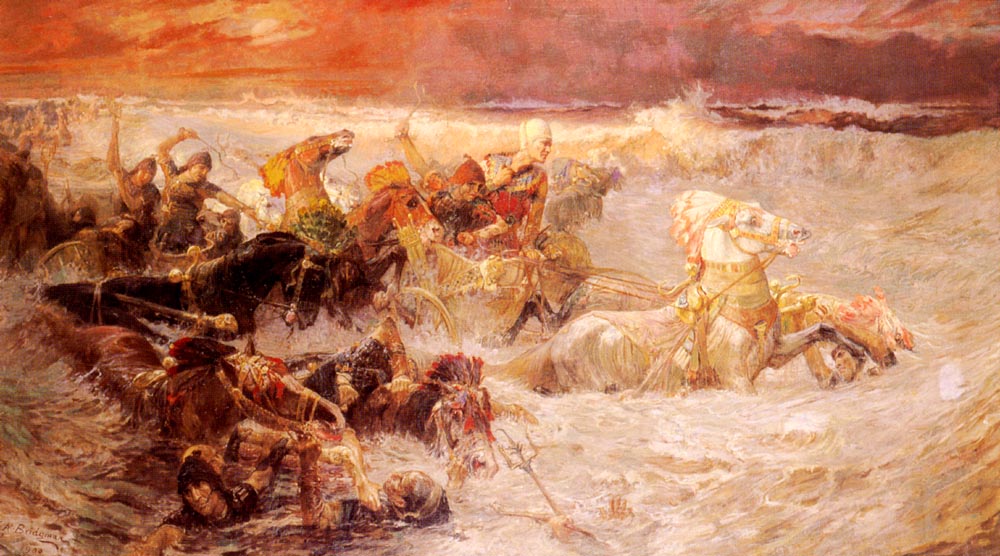
Women, Men, and Angels
When the Israelites left Egypt and God split the sea for them the angels wanted to praise Him. He told them: “let Moshe and Israelites sing first”. And so it was that the Israelite men sang first, the angels sang last, and the women sang in between.
This beautiful scene is in Midrash Rabbah’s commentary on Exodus 15:21:
Miriam the prophetess took the tambourine in her hand, and all the women followed her, dancing with tambourines. She chanted with them…
In the Geonic commentary Pitron Torah on Parashat Haazinu we find a different order:
התחילה מרים ונשים בשירה, ואחר כך אמרו ישראל, ואחר כך מלאכי השרת עמהן
Miriam and the women started to sing, then the men, and then the angels joined.
This author felt that the important role women played in saving, raising, and educating Moshe, granted them the right to initiate The Song of Redemption. Indeed, Rashi relates the singing of the women to the famous statement “in the merit of righteous women the Israelites were redeemed from Egypt”. He explains why the women had musical instruments with them:
מובטחות היו צדקניות שבדור שהקדוש ברוך הוא עושה להם נסים והוציאו תופים ממצרים
The righteous women were confident that God would perform miracles for them, so they brought with them tambourines from Egypt.
A Woman’s Voice
But Rashi also emphasizes that Moshe was singing with the men while Miriam chanted for the women. According to Rashi Moshe chanted and the men responded, whereas the women remained passive and only listened to Miriam:
ותען להם מרים – משה אמר שירה לאנשים, הוא אומר והם עונין אחריו, ומרים אמרה שירה לנשים
Rashi’s commentary served as a basis for a later debate on singing in front of men. R. Yohanan Lurie asks why the women did not sing the Song of the Sea as the men did . He answers that because they were singing loudly in front of men, they were not allowed to sing for a long time. The women, says R. Lurie, had to limit themselves to the minimum necessary to praise God:
מאחר שהוא שיר ויאמר בקול רם צריכות לקצר לפני האנשים, כי קול באשה ערוה, על כן לא שרו רק לפי המחוייב כדי להזכיר הנס
Since a song is chanted loudly, they had to be brief [while singing] in front of men. [Hearing] a woman’s voice is immodest, and they therefore sang only what was mandatory to mention the miracle.
Singing for a Shidduch
Rabbi Lurie quotes the Talmudic statement that hearing women’s voices is immodest. This statement was originally limited to reading the Shema while one’s wife is singing. It is interesting to note that he does not say that singing is totally forbidden, only that it must be curtailed. He mentions a practice prevalent in his time of women singing at weddings:
ומזה הטעם ראוי למחות לנשים המשוררות לכלות לפני האנשים רק הבתולות שמותרים בזה כדי לחבב הבחורים לקפוץ עליהם לשם אישות
We should rebuke the women who sing for the bride in front of men. It is only allowed to unmarried women to make them attractive to the young men who will then want to marry them.
When we read these words, we can understand why orthodox circles reject the study of history. In a tight knit orthodox community in 15th century Germany, women were singing with men at weddings. The prominent rabbi who reports this wants to stop the practice but says that unmarried women should do so to attract suitors. That cannot be reconciled with the total prohibition in orthodox circles on hearing a woman singing, or with the practice of some sects to have separate wedding halls for men and women. We should be thankful that they allow the bride and groom to be in the same hall, and let the women watch the ceremony on a “Kosher” screen?
A Chorus is Fine
R. Avraham Abele Gombiner, aka the Magen Avraham, agrees with R. Lurie . He finds a very creative way to interpret Rashi’s words that Miriam was singing to the women. He writes:
She obviously did not address the men when she said: “praise God,” because it is immodest. Also, one is not allowed to hear a singing woman’s voice. We could say that the original Midrash read לשנים instead of לנשים, meaning that she called out to two women, and they responded.
R. Gombiner suggests that the Talmudic prohibition wants to prevent attraction to the singing woman, and it applies only when one woman is singing. When two women sing together, their voices are indistinguishable, and men cannot feel attracted to a specific one. R. Moshe Sternbuch attests that there was such a tradition among Ashkenazi Jews, and that it was relied on to allow singing around the Shabbat table.
The notion, explicitly written in the Torah, that Miriam sang in front of men, disturbed another renowned rabbi. R. Yehonatan Eybeschutz writes :
גם יש לפרש דלכך לקחו דוקא הנשים תופים בידם ולא האנשים, דאיכא קול באשה ערוה והם היו שוררים ומנגנים, ולכך לבל להכשיל אנשים לקחו בידם תופים לבל ישמע קולם.
We can also say that it was specially the women, rather than the men, who used tambourines, because [hearing] a woman’s voice is immodest. They used tambourines to cover their voices so they will not be an obstacle for the men.
Reverence Trumps Lust
R. Haim Yosef David Azulay disagrees with seeing Miriam’s song in the context of impure thoughts or with the claim that Miriam curtailed her singing :
הרא”ם ז”ל כתב בפירוש מאמר המכילתא דמרים אמרה כל השירה וכן מטים דברי רבינו בחיי ז”ל… ומה שכתב הרב זית רענן דקול באשה ערוה לא שייך הכא דאיכא אימתא דשכינתא
R. Eliyahu Mizrahi explicitly says that Miriam chanted the whole song, and that seems to be Rabbenu Bahya’s opinion… the argument of the author of Zayit Raanan that there is a problem of immodesty is not applicable here, because the men were at a state of reverence of the divine…
Reverence is mentioned elsewhere in R. Azulay’s writings. It means that when one is engaged in prayer or Torah learning, he feels the presence of the divine and controls his evil inclination. After crossing Yam Suf the Israelites were in a state of spiritual elevation. They were not susceptible to sexual attraction or impure thoughts stemming from hearing the women’s voices.
Evolution of a Prohibition
To summarize, it is obvious that the Talmudic prohibition was created to offer men boundaries for their personal prayers, a space from which women were excluded. The prohibition evolved to the description of the woman as a temptress and the man in need of protection. This in turn led to men controlling women and not letting them express themselves musically. By doing that, the rabbinic leadership deprived women of one of the most essential needs of mankind.
Throughout the ages, exceptions were made, tight boundaries were breached, and rabbis had to find ways to stop women from singing or explain “forbidden” practices. I have presented here some of the exceptions or excuses, including singing: in a chorus, with musical instruments, to praise God, to celebrate at a wedding, to find a shidduch. We also saw that singing in front of men in a state of reverence or prayer was allowed.
Miriam’s Divine Palace
Miriam’s song has suffered throughout the ages, and women’s voices are still silenced in many circles. I would like to conclude with this beautiful passage from the Zohar (Vol. III, 167:2). In this passage, the author describes the heavenly palaces of righteous women:
Miriam sings and praises the Master of the Universe every day.
All the women sing with her.
They sing the song of the Sea of Reeds.
She alone says the verse “Miriam took the tambourine”.
All the righteous people who are in the Garden of Eden listen to her pleasant song.
Hosts of holy angels are praising God with her.
Deborah does the same in another palace.
Together with all women they sing the song she chanted in this world.
Dear Rabbi [Shimon], Dear Rabbi [Shimon].
May we merit to see how the righteous men and women make God rejoice.
The author speaks of heaven, but I believe he envisions perfection in this world. It will be a world in which women’s voices are not silenced and men are not constantly concerned with impure thoughts. In that world, women will sing songs of praise and gratitude to God and men will listen and learn.
Questions for Kids: Parashat BeShalah
In פָּרָשַׁת בְּשַׁלַּח, finally, פַּרְעֹה lets בְּנֵי יִשְׂרָאֵל go free! בְּנֵי יִשְׂרָאֵל leave מִצְרַיִם!
- Why didn’t HaShem take בְּנֵי יִשְׂרָאֵל in the shortest way to the Promised Land?
- מֹשֶׁה takes with him something very important to bring to אֶרֶץ הַקֹדֶשׁ. What is it?
- How did ה’ accompany בְּנֵי יִשְׂרָאֵל in the desert during the day and during the night?
- Who chased בְּנֵי יִשְׂרָאֵל?
- What miracle did ה’ do when בְּנֵי יִשְׂרָאֵל arrived at יַם סוּף?
- Who tried to enter the sea but did not have the same miracle? What happened to them?
- בְּנֵי יִשְׂרָאֵל are so happy for being saved that they sing a special song. What is this song called?
- What is this Shabbat called?
- בְּנֵי יִשְׂרָאֵל complain that the water of מָרָה is bitter. What does ה’ tell מֹשֶׁה to do to make the water sweet?
- בְּנֵי יִשְׂרָאֵל complain that the they have no food. What does ה’ send them?
- How many portions do they receive on Friday?
- What do we put on our Shabbat table in memory of these portions?
- Why do בְּנֵי יִשְׂרָאֵל complain all the time?
- Who fought with בְּנֵי יִשְׂרָאֵל at the end of the Parasha?
- When מֹשֶׁה raised his hands, בְּנֵי יִשְׂרָאֵל were winning. Why?
Answer Guide for Parashat BeShalah
- So they will not have to fight the פְּלִשְׁתִּים.
- The coffin of יוֹסַף.
- During the day with עַמּוּד עָנָן and during the night with עַמּוּד אַשׁ.
- פַּרְעֹה וּמִצְרַיִם.
- ה’ parted יַם סוּף and they crossed it.
- The Egyptians. They drowned.
- שִׁירַת הַיָם.
- שַׁבָּת שִׁירָה.
- To throw a tree branch into the water.
- The מָן from heaven.
- Two.
- We put two חַלּוֹת.
- They are behaving like babies. They want ה’ to take care of everything.
- עֲמָלֵק.
- בְּנֵי יִשְׂרָאֵל would look up, remember ה’, and pray that ה’ will help them.








Ohr HaChaim Yomi – Emor